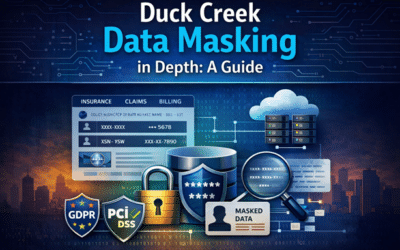
Data: The ROI of Data Security
24
JUNE, 2021
by Omkar Hiremath
Information technology and the digital world don’t exist without data. The data of an organization can contain a lot of unclassified, as well as classified information. Irrespective of that, only authorized personnel should have access to data. However, malicious actors try to breach security and get access to data, and it’s not good for the organization if they succeed.
Everybody agrees that data security is crucial to any organization. But with so many security services, techniques, products, and approaches, it can be difficult to choose how to implement security. When it comes to data security, the more the better. But data security is not cheap. And this raises questions like “Is it worth it?” and “What am I getting in return?” This post answers these questions.
I’ll start by discussing the importance of data security and what you risk if you don’t have it, and then talk about the return on investment (ROI) of data security.
Why Is Data Security Important?
First, we need to understand that cybersecurity is not just about preventing cyberattacks. Security is about confidentiality, integrity, and availability, aka the CIA triad. So when we talk about data security, we talk about
- confidentiality and restriction of data to authorized personnel only,
- accuracy of data and preventing its modification or corruption without legit intent/action, and
- availability of data, when and to whom it’s supposed to be available.
If data security takes care of these issues, we have as a result the outcomes discussed below.
Prevent Data Breaches
Data security requires implementing various preventive measures against data breaches. Adding multiple layers of security makes it hard for a data breach to happen. Data security not only prevents cyberattacks from outside the organization, but also prevents malicious or accidental breaches from within the organization.
Protect Privacy
An organization has a lot of private data, which could come from employees or customers. For example, an organization might have collected employees’ addresses, social security numbers, or other personal information. Or customers might store details such as a credit card number or mobile phone number on an e-commerce site, so that when they want to purchase something, they don’t have to enter their information every time. Another example is that by saving a phone number, customers can avoid entering it every time to receive an one-time password.
When somebody shares their private information with an organization, they share it because they trust the organization. Data security protects their privacy and as a result, maintains their trust.
Increase Brand Value and Revenue
When an organization has data security and proof of concept (POC) of how secure it is, its brand value increases. People gain confidence in working with organizations that take data security seriously. For example, you’d be more comfortable saving your credit card details on Amazon than saving it on another e-commerce application that has a bad data security reputation.
Hence, data security is important to prevent breaches and also to increase business.
Impact of Not Having Data Security
Successful cyberattacks are an obvious result of not having data security. But there’s more. Some organizations don’t deal with confidential data. So can they ignore data security? Of course not! Data breaches are bad, and they are bad even if the data is not confidential. Here’s how not having data security impacts an organization, irrespective of whether data is confidential or not.
Impact on Reputation
When you don’t have good enough data security, your reputation goes down. Nobody would want to do business with an organization with a lengthy history of data breaches. I don’t mean to scare you, but this is the truth. In this competitive world, not having data security will let your competitors take over. You might provide the best products and services, but if you lack data security, your reputation can prevent you from generating business.
Impact on Business
Organizations rely on data for their businesses to work. From sales and support to development and services, data is key. Having bad or corrupted data can stop certain processes. If contact details of potential customers are lost or encrypted by a malicious actor, how will the sales team convert them to customers? The sales process would stop.
In some cases where data becomes corrupted, you might end up with processes that have no value. For example, let’s say customer A requests that you provide details of their transactions with your company. But due to corrupted data, this request appears as if it was made by customer B. If you complete the request for customer B instead of customer A, your work is of no value because customer B did not make the request and the information is not required. And also, you’re wasting time by not working on customer A’s request. Thus, a lack of data security affects business to a great extent.
Fines
There are a lot of rules and regulations that organizations need to follow, and a lot of these regulations relate to data. Governing bodies are very strict about compliance, and to make sure this happens, they fine organizations heavily in case of compliance failure. So, if you don’t have data security, you won’t be compliant and you’ll have to pay heavy fines.
ROI of Data Security
ROI means return on investment. It’s a measure of what you gain from your investments. If you invest in a store, the profits you make from the store would be the ROI. Data security is a smart investment, but it’s not the type of investment that makes direct profits. In the case of data security, you have to calculate the ROI by determining how much loss you prevent. Let’s see what kinds of loss data security prevents.
Incident Losses
As discussed earlier, missing or corrupted data can affect business. A loss in business or revenue due to missing or corrupted data results in incident loss. If you use hardware and software tools for data security, any damage to these tools or products due to an incident can also be added to incident losses. Incident losses are basically any loss that happens due to a data breach or illegitimate change in data. Incident loss could come from an external or internal entity and can either be intentional or accidental.
Fines
If you have good data security, you will be saved from the fines levied by regulatory bodies for noncompliance. But just being compliant is not enough. You need to take extra care to prevent data breaches. A lot of organizations have paid millions of dollars in fines, penalties, and compensation for data breaches. When you’re compliant and you prevent data breaches, you save a lot of money.
System Repair
You can’t just leave things as they are after an incident — a lot of fixing must occur. You need to apply patches, bring damaged systems back to operational condition, update or upgrade the systems that caused the breach, and a lot more. All of this comes at a cost, but when you implement data security and prevent incidents, you save money.
Calculating ROI of Data Security
All the money saved by using data security is profit. ROI is usually expressed as a percentage. If you want to know the ROI of your data security, you need to first get an estimate of the losses and expenses you’ve prevented. As a reference, you can use another company’s loss due to a data breach. Once, you’ve calculated how much money you’ve saved, you can calculate the ROI using this simple formula:
((Money saved due to data security – Investment for data security) ÷ Money saved due to data security) × 100
For example, if you invested $2000 in data security and you’ve saved $5000, your ROI would be ((5000-2000)÷5000)×100 = 60%.
Winding Up
Data security holds great importance in this age. You might not see the ROI for data security in the beginning, but when you realize how much trouble and money it saved you, you won’t regret investing in data security. It’s a “better safe than sorry” situation. You’ll find a lot of products and services to help implement data security and prevent data breaches. If you see the value data security offers, start right away with it!
Omkar Hiremath
This post was written by Omkar Hiremath. Omkar is a cybersecurity analyst who is enthusiastic about cybersecurity, ethical hacking, data science, and Python. He’s a part time bug bounty hunter and is keenly interested in vulnerability and malware analysis.
Relevant Articles
A Data Loss Prevention Security Checklist for Enterprise
Companies today are collecting more data than ever and using analytics to influence everything from sales and marketing to research and development. In fact, data is now one of the most valuable assets that a company can own. Yet while data is more important...
Enterprise Architecture Principles: 13 for Resilience
Modern enterprises operate in environments defined by constant change. Cloud adoption, regulatory pressure, cybersecurity threats, distributed teams, and accelerating release cycles all increase the complexity of the IT landscape. In this environment, resilience is no...
Duck Creek Data Masking in Depth: A Guide
Insurance platforms are data-heavy by design. Customer identities, policy records, payment details, underwriting notes, claims histories. In a Duck Creek ecosystem, that data powers critical business processes across policy, billing, and claims. It also creates...
What is a Microservice Catalog? A Detailed Explanation
Microservices have revolutionized the way modern software systems are designed and developed. Breaking down complex applications into smaller, independently deployable services brings numerous benefits in terms of scalability, flexibility, and maintainability....
Delphix Alternatives: 7 to Consider in 2026
If you’re searching for delphix alternatives, you’re likely evaluating your test data management strategy. Delphix is widely recognized for data virtualization and masking, but it is not the only option available. As enterprise environments grow more complex and...
Enterprise Release Manager: A Guide to the Role
Do you want your company to scale efficiently? Look for an enterprise release manager (ERM). An ERM protects and manages the movements of releases in multiple environments. This includes build, test, and production environments. They ensure that there is a proper...









